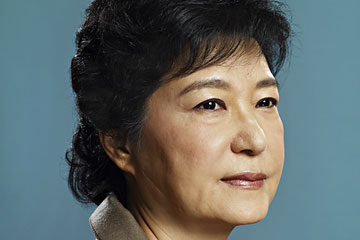
"I know how fleeting and, at times, harrowing political power can be," says Park Geun-hye
(3 of 4)
But being a dictator's daughter exacts a psychic toll. Her father — who was shot dead at a dinner by his own intelligence chief for reasons still unclear — made development his top priority. ("In human life, economics precedes politics and culture," he famously wrote.) As South Korea's economy strengthened, he tightened his hold on the country. Up till the late 1970s, thousands of opposition figures were arrested, and sometimes tortured, under draconian security regulations. In a recent speech, Park's challenger Moon, who was jailed by Park Sr.'s regime for his activism, recalled that "it was a world where tanks would be running around campus, and schools were forced to shut down for months." Despite violent crackdowns by Park and his autocratic successors, also military men, the struggle for liberty persisted until 1987, when the country held its first free and fair presidential election in decades.
After her father's assassination, Park retreated from the spotlight, living in relative seclusion. Eventually she returned to political life. In 1998 she became a legislator, being re-elected four times. While she was on the campaign trail in 2006, an ex-convict lunged from the crowd and slashed her with a box cutter. Television footage showed Park calmly trying to stanch the bleeding from the 10-cm gash to her right cheek. A recent TV spot turns her still visible scar into a metaphor for sacrifice and national healing. "The wound inflicted that day ... changed me completely," she narrates. "Since then I have decided to dedicate the rest of my life tending to your wounds."
In 2007, Park sought the conservative camp's presidential nomination but lost to Lee Myung-bak, the outgoing incumbent. (South Korean Presidents serve single five-year terms.) Lee, a former construction CEO, was popular when he was elected; citizens figured that as a former business boss he would be decisive. But his time in office has proved humdrum, and the latter stage of his tenure has been tarnished by corruption scandals involving his relatives and aides. In a recent report, moreover, Amnesty International accused the Lee government of expanding the use of the National Security Law to suppress free speech. In February, Park helped rebrand Lee's besieged Grand National Party as Saenuri, meaning "New Frontier." She then led it to an unexpected victory in the April parliamentary polls.
Today, Park stands to gain from South Korea's young democracy by winning the highest office in the land through the vote instead of the gun, as her father did. Yet for years she would not criticize him, saying only that "history and the people" would judge his record. In September, as public pressure mounted and her poll numbers slid, she modified her message, but without condemning him outright. "In the shadows of South Korea's rapid growth, there was pain, suffering and irregularities as well as various human-rights abuses committed by authorities," she said in a televised address. "I deeply apologize to all those who were personally hurt and family members of victims of government abuse." Her statement satisfied few. Some conservatives accused her of caving to political pressure, besmirching her father's name to score political points. Others questioned her sincerity. "The people are not holding her responsible for the sins of her father but asking about her interpretation of history," says Yu Chang-seon, a liberal writer and pundit. "She has a duty to answer."
Generation Gap
History weighs less heavily on younger South Koreans who, born into relative affluence, are more concerned with the country's democratic future than its authoritarian past. Words like duty do little for Kim Ou-joon, 43, the host of what — at a reported 10 million downloads — is one of South Korea's most popular podcasts. Kim specializes in quasi-journalistic, quasi-comedic takedowns of Seoul's conservative establishment, especially departing President Lee. This election, he says, is about holding government to account and addressing the concerns and struggles of ordinary people. He is mystified by the older generation's romantic view of the Parks. "Park Geun-hye talks about the future," he says, "but she doesn't represent it."
